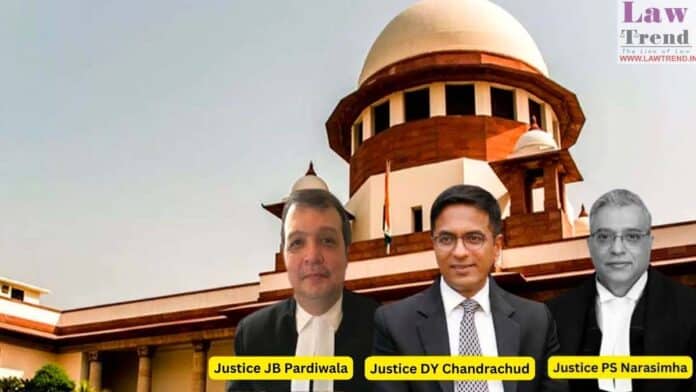The Supreme Court on Monday said it will deal decide “once and for all” the legal issue of whether the earlier apex court judgement laying down procedures for the appointment of the Director General of Police (DGP) in states will also be applicable to Delhi and other cities.
The top court, hearing petitions challenging the appointment of senior IPS officer Rakesh Asthana as the Delhi Police Commissioner, said the pleas, so far as they relate to the appointment of Asthana, have become infructuous as the officer has superannuated.
However, the part Delhi High Court verdict, which had held that the apex court judgement in the Prakash Singh case applies to state DGPs only and not to cities like Delhi and the selection of Commissioner of Police, needs to be dealt with as it has a recurring effect, a bench headed by Chief Justice D Y Chandrachud said and added the matter will be listed in April.

While dismissing the plea of NGO Centre for Public Interest Litigation’ (CPIL), the high court had said the apex court decision in the Prakash Singh case, which mandated a minimum tenure for certain police officials and the constitution of a UPSC panel before selection, was not applicable to the appointment of the Police Commissioner for Delhi.
“This observation (of Delhi High Court) is required to be dealt with because this issue has a recurring effect… We will accordingly list this SLP (special leave petition) in April so that the issue is resolved,” said the bench which also comprised Justices P S Narasimha and J B Pardiwala.
Lawyer Prashant Bhushan, appearing for NGO CPIL, said unless the issue, arising out of the Delhi High Court verdict, is dealt with “it will keep coming up again and again”.
“We will decide this once and for all,” the CJI said.
The bench, meanwhile, disposed of another petition seeking the appointment of a new DGP in Sikkim after it was apprised that the exercise has been completed as per the procedures prescribed by the apex court.
Amarendra Kumar Singh, a 1990 batch IPS officer, has been appointed as the new DGP of Sikkim and he took charge on January 4, 2023. He will continue as the DGP till January 4, 2025.
Earlier on January 16, the apex court had disposed of the petition of the NGO CPIL’ challenging the appointment of now-retired IPS officer Rakesh Asthana as the Delhi Police Commissioner.
The top court, while closing the pleas, had then said that the legal issues involved would remain open for adjudication.
Asthana, a 1984-batch Gujarat cadre IPS officer, who was serving as the Director General of the Border Security Force, was appointed the Delhi Police Commissioner on July 27, 2021 just four days before he was scheduled to retire. He was shifted to the Union Territory cadre from the Gujarat cadre for one year.
Asthana retired on July 31, last year.
The high court had dismissed the pleas challenging Asthana’s appointment as the Delhi police chief. In its affidavit, the Centre had said the NGO’s petition is an abuse of the process of law and, manifestly, an outcome of some personal vendetta against the then police commissioner.
The high court, in its verdict, had upheld the Centre’s decision to appoint Asthana as the Delhi Police Commissioner, saying there was “no irregularity, illegality or infirmity” in his selection.
Dismissing the PIL challenging his selection, it had said the justification and reasons given by the Centre for appointing Asthana are “plausible, calling for no interference in judicial review”.
The 2006 apex court verdict in the Prakash Singh case said the DGP of a state shall be “selected by the state government from amongst the three senior-most officers of the department who have been empanelled for promotion to that rank by the UPSC on the basis of their length of service, very good record and range of experience for heading the police force”.
And, once a person has been selected for the job, they should have a minimum tenure of at least two years irrespective of the date of superannuation, it had said.
The DGP may, however, be relieved of his responsibilities by the state government acting in consultation with the State Security Commission, consequent upon any action taken against him under the All India Services (Discipline and Appeal) Rules or following his conviction in a court of law in a criminal offence or a case of corruption, or if he is otherwise incapacitated from discharging his duties, the court had said.







